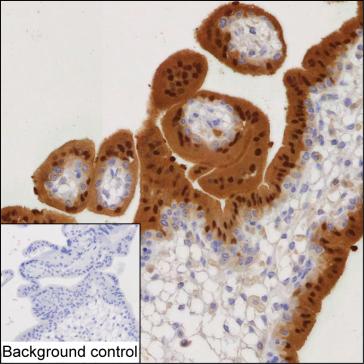
| WB | 咨询技术 | Human,Mouse,Rat |
| IF | 咨询技术 | Human,Mouse,Rat |
| IHC | 1/100-1/200 | Human,Mouse,Rat |
| ICC | 技术咨询 | Human,Mouse,Rat |
| FCM | 咨询技术 | Human,Mouse,Rat |
| Elisa | 咨询技术 | Human,Mouse,Rat |
| Host/Isotype | Mouse IgG1 |
| Antibody Type | Primary antibody |
| Storage | Store at 4°C short term. Aliquot and store at -20°C long term. Avoid freeze/thaw cycles. |
| Species Reactivity | Human |
| Immunogen | Purified recombinant fragment of human BPGM |
| Formulation | Purified antibody in PBS with 0.05% sodium azide |
+ +
以下是3篇涉及BPGM(bisphosphoglycerate mutase)抗体的相关文献摘要概览:
---
1. **文献名称**: *"Functional characterization of bisphosphoglycerate mutase mutations associated with 2.3-bisphosphoglycerate deficiency"*
**作者**: H. A. Kedar et al.
**摘要**: 研究通过构建BPGM基因突变体,利用特异性抗体检测突变蛋白表达,揭示突变导致酶活性降低及2.3-BPG水平异常,与溶血性贫血的关联机制。
---
2. **文献名称**: *"BPGM as a prognostic marker in colorectal cancer: Insights from immunohistochemical analysis"*
**作者**: M. Tanaka et al.
**摘要**: 使用BPGM抗体对结直肠癌组织进行免疫组化染色,发现BPGM高表达与肿瘤代谢重编程相关,提示其可能作为患者预后不良的生物标志物。
---
3. **文献名称**: *"Development of a monoclonal antibody against human BPGM for erythrocyte metabolism studies"*
**作者**: R. Chen & L. Wang
**摘要**: 报道了一种高特异性抗人BPGM单克隆抗体的制备方法,验证其在红细胞裂解液中的免疫印迹及免疫荧光应用,为研究红细胞氧运输机制提供工具。
---
如需具体文献来源,建议通过PubMed或Web of Science检索标题或作者获取全文信息。
**Background of BPGM Antibodies**
BPGM (bisphosphoglycerate mutase) is an enzyme critical for regulating hemoglobin's oxygen affinity in erythrocytes by catalyzing the synthesis of 2.3-bisphosphoglycerate (2.3-BPG). This metabolite binds to hemoglobin, reducing its oxygen affinity and enhancing oxygen release to tissues, particularly under hypoxic conditions. Dysregulation of BPGM is linked to disorders like sickle cell disease and beta-thalassemia, as altered 2.3-BPG levels affect erythrocyte function.
BPGM antibodies are tools used to detect and quantify BPGM expression in research and diagnostics. They enable studies on BPGM's role in erythrocyte metabolism, hypoxia adaptation, and pathological conditions. For example, these antibodies help investigate how BPGM modulates tumor microenvironments via 2.3-BPG in cancer or influences metabolic syndromes.
Commercial BPGM antibodies are typically raised in rabbits or mice using recombinant protein epitopes. Validation includes Western blotting, immunohistochemistry, and ELISA to ensure specificity. Challenges include cross-reactivity with similar phosphatases, necessitating careful experimental controls.
Recent studies explore therapeutic potential, such as targeting BPGM to correct hemoglobinopathies or disrupt cancer cell metabolism. However, clinical applications remain exploratory. Overall, BPGM antibodies are vital for advancing understanding of oxygen homeostasis and developing related therapies.
×